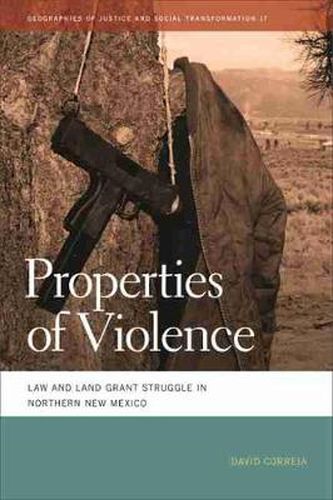Readings Newsletter
Become a Readings Member to make your shopping experience even easier.
Sign in or sign up for free!
You’re not far away from qualifying for FREE standard shipping within Australia
You’ve qualified for FREE standard shipping within Australia
The cart is loading…






Through a compelling story about the conflict over a notorious Mexican-period land grant in northern New Mexico, David Correia examines how law and property are constituted through violence and social struggle.
Spain and Mexico populated what is today New Mexico through large common property land grants to sheepherders and agriculturalists. After the U.S.-Mexican War the area saw rampant land speculation and dubious property adjudication. Nearly all of the huge land grants scattered throughout New Mexico were rejected by U.S. courts or acquired by land speculators. Of all the land grant conflicts in New Mexico’s history, the struggle for the Tierra Amarilla land grant, the focus of Correia’s story, is one of the most sensational, with numerous nineteenth-century speculators ranking among the state’s political and economic elite and a remarkable pattern of resistance to land loss by heirs in the twentieth century.
Correia narrates a long and largely unknown history of property conflict in Tierra Amarilla characterised by nearly constant violence-night riding and fence cutting, pitched gun battles, and tanks rumbling along the rutted dirt roads of northern New Mexico. The legal geography he constructs is one that includes a surprising and remarkable cast of characters: millionaire sheep barons, Spanish anarchists, hooded Klansmen, Puerto Rican terrorists, and undercover FBI agents. By placing property and law at the centre of his study, Properties of Violence provocatively suggests that violence is not the opposite of property but rather is essential to its operation.
$9.00 standard shipping within Australia
FREE standard shipping within Australia for orders over $100.00
Express & International shipping calculated at checkout
Through a compelling story about the conflict over a notorious Mexican-period land grant in northern New Mexico, David Correia examines how law and property are constituted through violence and social struggle.
Spain and Mexico populated what is today New Mexico through large common property land grants to sheepherders and agriculturalists. After the U.S.-Mexican War the area saw rampant land speculation and dubious property adjudication. Nearly all of the huge land grants scattered throughout New Mexico were rejected by U.S. courts or acquired by land speculators. Of all the land grant conflicts in New Mexico’s history, the struggle for the Tierra Amarilla land grant, the focus of Correia’s story, is one of the most sensational, with numerous nineteenth-century speculators ranking among the state’s political and economic elite and a remarkable pattern of resistance to land loss by heirs in the twentieth century.
Correia narrates a long and largely unknown history of property conflict in Tierra Amarilla characterised by nearly constant violence-night riding and fence cutting, pitched gun battles, and tanks rumbling along the rutted dirt roads of northern New Mexico. The legal geography he constructs is one that includes a surprising and remarkable cast of characters: millionaire sheep barons, Spanish anarchists, hooded Klansmen, Puerto Rican terrorists, and undercover FBI agents. By placing property and law at the centre of his study, Properties of Violence provocatively suggests that violence is not the opposite of property but rather is essential to its operation.